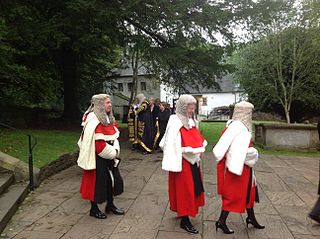Related Research Articles

The Court of Appeal is the highest court within the Senior Courts of England and Wales, and second in the legal system of England and Wales only to the Supreme Court of the United Kingdom. The Court of Appeal was created in 1875, and today comprises 39 Lord Justices of Appeal and Lady Justices of Appeal.

The Chancellor of the High Court is the head of the Chancery Division of the High Court of Justice of England and Wales. This judge and the other two heads of divisions sit by virtue of their offices often, as and when their expertise is deemed relevant, in a panel in the Court of Appeal. As such this judge ranks equally to the President of the Family Division and the President of the King's Bench Division.

There are various levels of judiciary in England and Wales—different types of courts have different styles of judges. They also form a strict hierarchy of importance, in line with the order of the courts in which they sit, so that judges of the Court of Appeal of England and Wales are given more weight than district judges sitting in county courts and magistrates' courts. On 1 April 2020 there were 3,174 judges in post in England and Wales. Some judges with United Kingdom-wide jurisdiction also sit in England and Wales, particularly Justices of the United Kingdom Supreme Court and members of the tribunals judiciary.

A Justice of the High Court, commonly known as a ‘High Court judge’, is a judge of the High Court of Justice of England and Wales, and represents the third highest level of judge in the courts of England and Wales. High Court judges are referred to as puisne judges. High Court Judges wear red and black robes.

Dame Victoria Madeleine Sharp,, PC is the President of the King's Bench Division of the High Court of Justice in England and Wales.

The Judges' Council is a body in England and Wales that, representing the judiciary, advises the Lord Chief Justice on judicial matters. It has its historical roots in the original Council of the Judges of the Supreme Court, created by the Judicature Act 1873 to oversee the new Supreme Court of Judicature. This body initially met regularly, reforming the procedure used by the circuit courts, and the new High Court of Justice but met less regularly as time went on, meeting only twice between 1900 and 1907, with a gap of ten years between meetings in 1940 and 1950 respectively. After relative inactivity, it was eventually wound up through the Supreme Court Act 1981, which contained no provisions for its continued existence, something Denis Dobson attributes to newer bodies which performed the duties the Council had originally been created to do.

The High Court of Justice in London, known properly as His Majesty's High Court of Justice in England, together with the Court of Appeal and the Crown Court, are the Senior Courts of England and Wales. Its name is abbreviated as EWHC for legal citation purposes.

Sir Andrew Ewart McFarlane is a British judge. He was a Lord Justice of Appeal in England and Wales from 2011 to 2018, and became President of the Family Division in July 2018 upon Sir James Munby’s retirement from that office.
Sir Michael John Burton, styled Mr Justice Burton, is a former judge in the High Court of England and Wales. He was the President of the Investigatory Powers Tribunal between October 2013 and September 2018, having been vice-president since its inception in 2000, the Chair of the Central Arbitration Committee for over 17 years and the former President of the Employment Appeal Tribunal (2002–2005), which was reformed under his presidency.

Sir Keith John Lindblom, PC, styled The Rt Hon Lord Justice Lindblom, is a King's Counsel and current Lord Justice of Appeal in the Court of Appeal.

Sir Wyn Lewis Williams, is a Welsh judge who is the President of Welsh Tribunals. He had been a High Court judge from 2007 until his retirement on 10 February 2017.

Sir Timothy Victor Holroyde, PC, styled The Rt. Hon. Lord Justice Holroyde, is an English Court of Appeal judge, formerly a judge of the High Court of Justice of England and Wales, Queen's Bench Division. He was appointed to the Court of Appeal in October 2017. He was sworn of the Privy Council in 2017. In 2015 he was appointed a member of the Sentencing Council for England and Wales, and served as its Chairman between 2018 and 2022. In June 2022 he was appointed Vice-President of the Court of Appeal, succeeding Lord Justice Fulford.

Sir Peter Marcel Roth, styled The Hon. Mr Justice Roth, is a British High Court judge.
Sir Ian William Dove, styled The Hon. Mr Justice Dove, is a judge of the High Court of England and Wales.

Dame Ingrid Ann Simler, DBE, styled The Rt Hon Lady Justice Simler, is a judge of the Court of Appeal of England and Wales.
Sir Akhlaq Ur-Rahman Choudhury is a British High Court judge of England and Wales. In 2017, he was made Knight Bachelor on appointment, becoming the first British-Bangladeshi and Muslim to be appointed to the High Court of Justice.
Sir David John Holgate, styled The Hon. Mr Justice Holgate, is a judge of the High Court of England and Wales.

Sir Timothy Miles Fancourt, styled Mr Justice Fancourt, is a judge of the English High Court.

The King's Bench Division of the High Court of Justice deals with a wide range of common law cases and has supervisory responsibility over certain lower courts.
References
- ↑ "Transfer of Sir William Charles from the Family Division to the Queen's Bench Division". Ministry of Justice.
- ↑ "Sir (Arthur) William Hessin Charles". Burke's Peerage. Retrieved 10 December 2012.
- ↑ "The Hon Mr Justice Charles". Debrett's People of Today. Retrieved 10 December 2012.
- ↑ "No. 55018". The London Gazette . 19 January 1998. p. 619.
- ↑ "Appointment of Chamber President of the Upper Tribunal" (Press release). Judiciary of England and Wales. 2 March 2012.
- ↑ "Family Law Week: Mr Justice Charles appointed Vice-President of the Court of Protection". www.familylawweek.co.uk.
- ↑ "Lincoln's Inn Great Hall, Ed57 Charles, W". Baz Manning. 13 July 2009. Retrieved 19 December 2020.